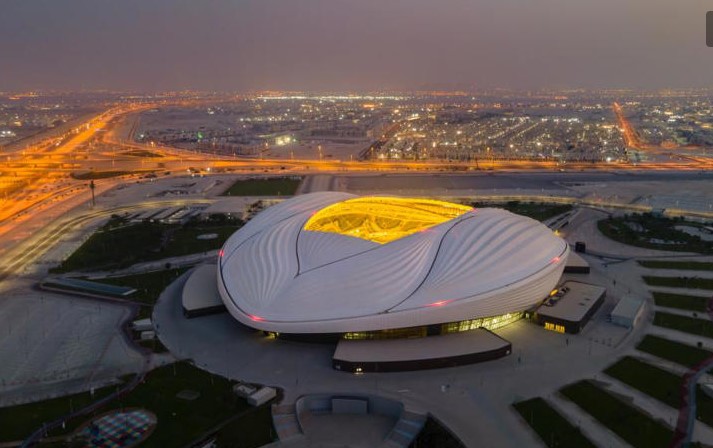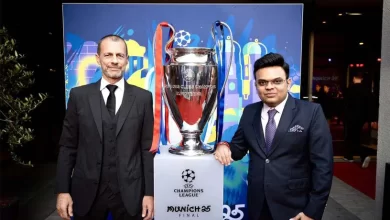Qatar World Cup imposes ‘chilling’ restrictions on media

International television crews in Qatar for the Fifa World Cup will be banned from interviewing people in their own homes as part of sweeping reporting restrictions that could have a “severe chilling effect” on media coverage.
Broadcasters, such as the BBC and ITV, will also be forbidden from filming at accommodation sites, such as those housing migrant workers, under the terms of filming permits issued by the Qatari government.

nstead, they will be permitted to film in public places in only three locations in Doha: the Corniche waterfront promenade, the West Bay area and the Towers area.
Capturing footage “near or within” government buildings, universities, places of worship and hospitals is also prohibited, along with recording on “any privately owned property”, even with the owner’s consent.
The restrictions are within a list of conditions that outlets must agree to when applying for a filming permit from the Qatari authorities to “capture photography and videography of the most popular locations around the country”. They also apply to photographers but do not explicitly refer to print journalists who do not film their interviews.
The rules do not prohibit reports on specific subjects, but barring crews from filming on private property – “including but not limited to houses, apartment complexes, accommodation sites” – is likely to make it difficult for them to investigate reported abuses, such as the mistreatment of migrant workers, or to conduct interviews on subjects people may be reluctant to discuss in public, such as LGBTQ+ rights.
The rules also say applicants “acknowledge and agree” they will not produce reports that may be “inappropriate or offensive to the Qatari culture, Islamic principles” or “may arouse ethnic or religious disturbances”. They add that organisations will be “held responsible for criminal and civil liability for any breach of the above mentioned provisions when filming”.
Qatar’s supreme committee for delivery and legacy did not respond to requests for comment on the rules, which are published in its official media portal.
Fifa said it was “working with the supreme committee and relevant organisations in Qatar to ensure the best possible working conditions for media attending the tournament, as well as ensuring that broadcasters continue to report freely without any restrictions”.
A spokesman said it would be “important to clarify that filming on private property in any country remains subject to approval of the owner/operator of the property”. He did not comment on why the terms include an outright ban on filming on private property.
Journalists have previously been detained in Qatar for reporting on issues deemed contentious by the authorities. In 2015, a group of BBC reporters were arrested in Doha and spent two nights in prison while investigating housing conditions for migrant workers. Last November, two Norwegian journalists investigating conditions for migrant labourers working on World Cup venues were arrested and detained for 36 hours as they tried to leave the country.
James Lynch, from FairSquare, a London-based human rights group, said the rules were an “extraordinarily sweeping range of restrictions” that would make it difficult for TV crews to pursue non-football-related stories. He said: “It would be incredibly difficult to fully comply with these terms, if even filming near to private or government property violates the terms of a permit.
“This is likely to have a severe chilling effect on free expression. How many organisations will authorise reporting on Qatar’s social issues if to do so puts them at risk of ending up in court?”
The restrictions present an ethical dilemma for broadcasters.
The BBC and ITV’s stringent editorial guidelines promote impartiality and are designed to protect against undue influence, including from governments. BBC guidelines, which apply to all content, say broadcasts should not unnecessarily offend but stress the importance of free expression.
Jemimah Steinfeld, editor-in-chief at Index on Censorship, said the film permit conditions were a “definite cause for concern” and appeared to be “purposely ambiguous” so that broadcasters would “err on the side of caution”.
She said her gut feeling was She felt they should not agree to such terms but said it was “extremely difficult terrain” to navigate. “The question is whether there might be stories that they can still do within the realms of that agreement, and is it more important that they do those stories?” she said. “If the BBC is basically being shoved into a position where all they can cover is the glory of it, then that would be a bad outcome.”
Qatar is an Islamic country with an authoritarian system of government. Swearing, public displays of affection and dressing immodestly are seen as offensive. Homosexual behaviour is illegal. Posting material that appears to insult, slander or is culturally insensitive may also be considered a crime, according to travel advice from the UK government.
In recent months, Qatar appears to have softened its stance on several issues in an attempt to convince visitors that it is safe and tolerant. It is allowing the sale of alcohol at stadiums, for instance, and has said that gay fans will be able to display affection during the World Cup. It has not eased rules restricting freedom of speech, which include a law against spreading “fake news” online.
The country’s World Cup bosses have attempted to discourage discussion of wider societal issues. In an interview with Sky News last week, Nasser al-Khater, the chief executive of the tournament, told football associations to focus on football instead of politics. “This is a sporting tournament that people want to come [to] and enjoy. Turning it into a platform of political statements I don’t think is right for the sport,” he said.
Related: Forget ‘sportswashing’: Qatar 2022 is about military might and hard sports power | Barney Ronay
The BBC, which will be offering “extensive coveragemedia”, did not say if it had agreed to or challenged the film permit rules, which are detailed in the official World Cup media portal.
A spokeswoman said the broadcaster had a “long, proud history of bringing major international football tournaments to audiences” and a “proven record of addressing topical issues as part of our coverage. This World Cup will be no different”.
ITV said its news and current affairs team had carried out “extensive reporting of the decision to award the tournament to Qatar and the questions surrounding the host nation’s human rights record and will continue to do so”.
“Our journalism will be robustly independent. ITV’s World Cup tournament coverage will focus on the football, but will not shy away from the controversies off the pitch,” a spokesman said.







